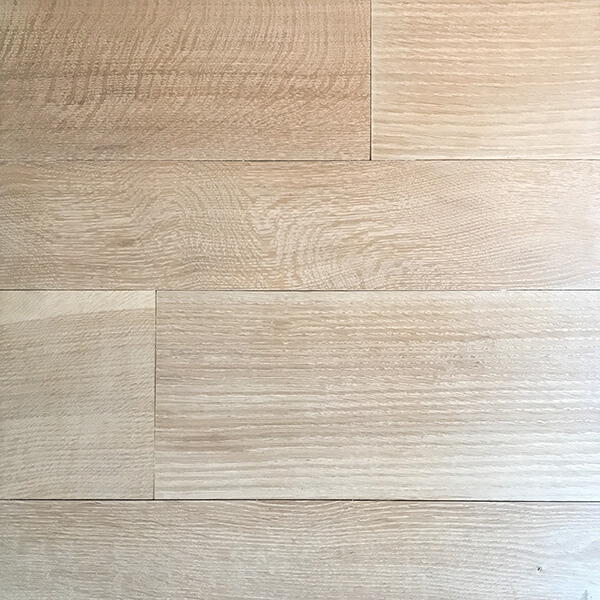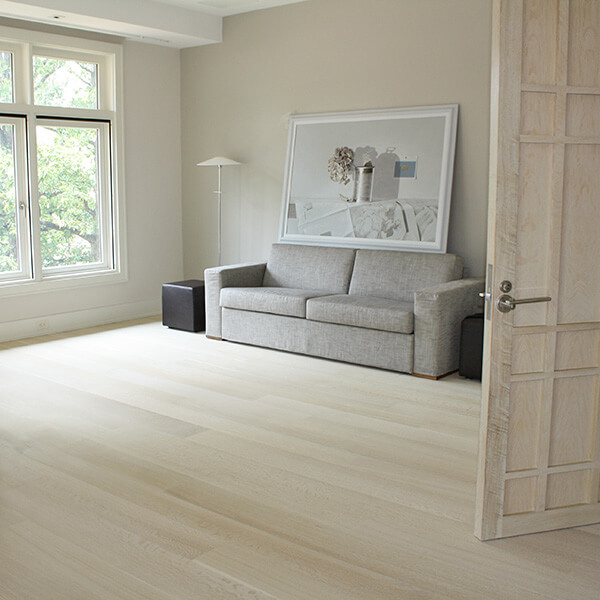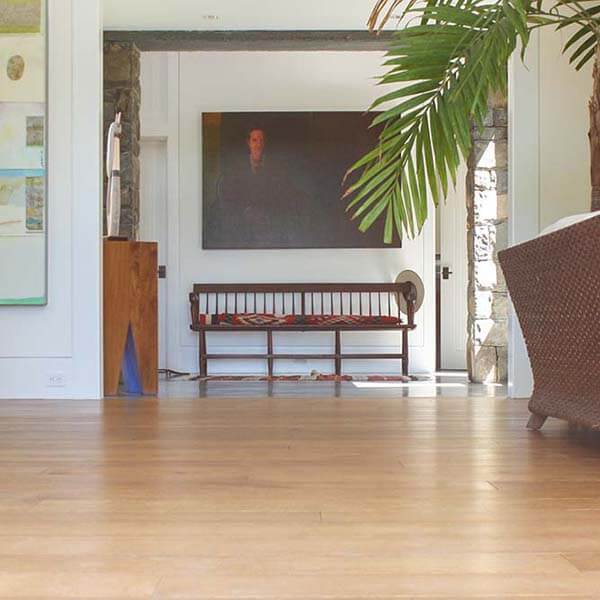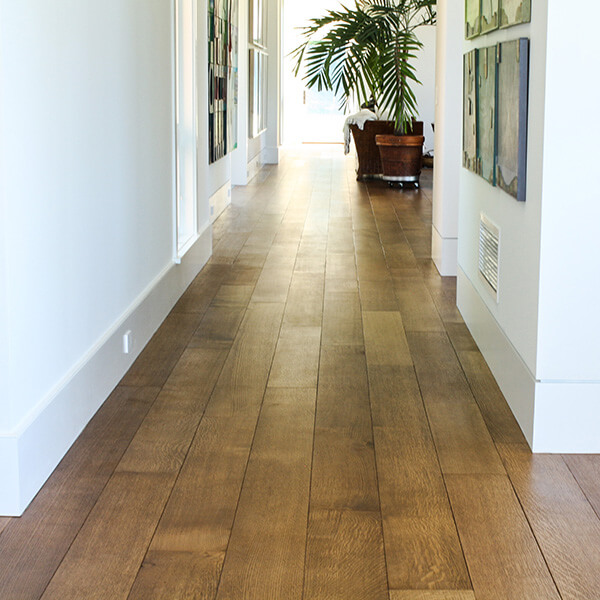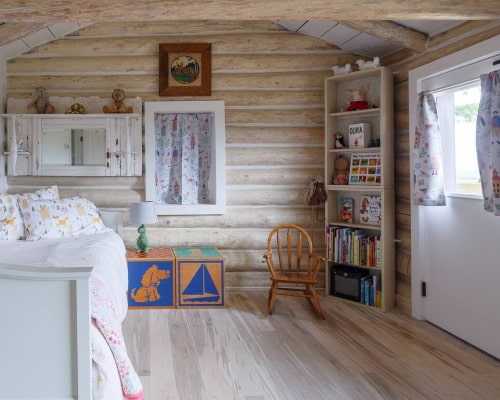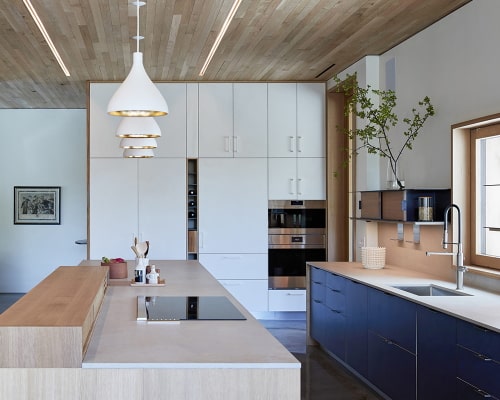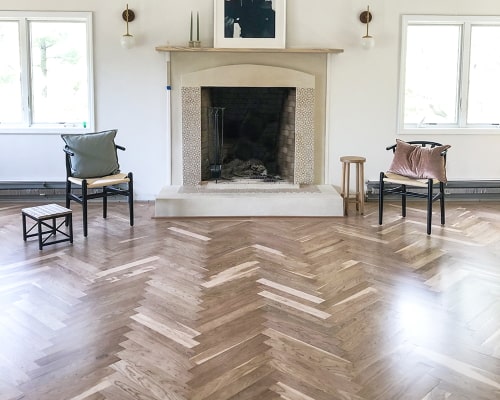White Oak - Rift & Quartersawn
Uncommonly refined, Rift and Quartersawn White Oak flooring is carefully milled to exhibit a clean look of long, straight grain patterns, occasional small knots, and beautiful flecking. Among the grades of oak, rift and quartered has become one of the most desired materials on the market.
Typically found in formal settings, this highly valued material is durable, stable, and takes a variety of coatings beautifully. Whether you favor a crisp white, a driftwood gray, or even a deep earthy brown, this white oak flooring will flow elegantly through your space.
Connect With UsDescription
- Specie: White Oak
- Janka Rating: 1360
- Thickness: milled 3/4″ for flooring, thicker material available
- Widths: random widths (3″ – 9″) and consistent widths (6″ and wider) are available
- Lengths: random lengths 1-1/2′ – 12′, minimum length requirements available
- Grade: select
- Kiln Dried: Absolutely!
- Lumber Source: new wood harvested using responsible forestry practices in NYS whenever possible
- Coating Options: available uncoated and pre-coated, custom colors available: VOC free oils, stains, tongue oils, etc.
- Character: occasional small knots, variation in color and grain pattern, flecking
- Texture: smooth
FAQS
The Janka Hardness Test measures how many pounds of force it takes to embed a .444” steel ball halfway into a piece of wood. This is helpful in determining if a wood specie is suitable for flooring. Harder wood species have higher numbers. Red Oak is our industry-standard for comparing different species. It has a Janka rating of 1290. Most hardwoods and many types of softwood are suitable for use as flooring, especially with proper install, coatings, and maintenance. Please note that all wood will dent with a forceful enough impact.
An example from Hypertextbook.com:
"Humans will only have one foot on the ground while walking. Estimate that the area of the heel on a man's shoe is 10in². When he walks, a 200 lb. man exerts 20 psi because the weight is supported momentarily by the heel. A 100 lb. woman exerts many more psi when she wears heels. Depending on the area of the heel, she can exert as much as 1600 psi under a 'stiletto heel' ¼ inch on a side. This explains why people with wood floors don't want women walking on them in high heels.”
We believe in solid wood flooring because we’ve witnessed how well it performs, especially when compared to engineered wood flooring. We only mill solid wood flooring.
When making solid wood flooring lumber comes straight from the tree, and then it is milled into your flooring. Simple right? Engineered wood flooring is made of layers. Generally, the base layer is made of wood particles bonded together with glue. The top layer is a thin piece of wood affixed to the base with adhesive.
Solid wood flooring is 100% wood. There are no chemical additives that will off-gas into your home. The top layer can’t de-laminate or de-bond because it has naturally bonded itself together. Manufacturing shortcomings such as areas of missing glue or low bonding pressure can’t affect solid wood. Sometimes engineered flooring has a tongue that doesn’t match the color of the face of the flooring. So, when the floorboards gap, a plywood colored strip shows between the seams.
Our solid wood flooring can be repaired, sanded and re-finished many times due to an extra thick wear layer (5/16” thick or 15.8 mm), unlike engineered flooring. Typical engineered flooring has a 2 – 4 millimeter wear layer. A nickel is 2 mm thick.
Solid wood flooring can last over 100 years when cared for properly. It adds value to homes. It reduces allergens (compared to carpet) and increases air quality (compared to engineered).
Many engineered wood flooring products have limitations on board lengths (6’ and shorter for example). This creates a choppy overall effect with lots of seams. This is not the case with our solid wood floors. Often, our average board length is 6’-8’.
While there are circumstances where engineered wood may perform better, please be aware that there is a class-action lawsuit against one of the largest suppliers of engineered wood flooring in the United States. Dangerous levels of carcinogenic formaldehyde emit from this flooring. Please do your homework and choose carefully.
- Wood is sterilized and insects are killed during this process. While some reclaimed wood is quite dry we must take this step to ensure that insects will not be moving into your home.
- Kiln dried wood absorbs coatings better. In fact, coatings will last longer.
- Kiln drying wood decreases shrinkage and movement in service. Non-kiln dried wood may shrink and de-form as it loses moisture from its environment.
Decreased weight makes for easier handling and installations.
Note: There is no way to prevent wood from absorbing water and releasing water into its environment. Trees are designed to drink water and this property can’t be completely diminished. Kiln drying is an important step in reducing (not eliminating) movement in your floors.
Upon inquiry, we will provide a written quote for approval and acceptance. Please review the quote carefully and verify that all quantities, species, sizes are what you ordered. The written quote must be signed and the required deposit must be received by Excelsior to initiate the order.
The Janka Hardness Test measures how many pounds of force it takes to embed a .444” steel ball halfway into a piece of wood. This is helpful in determining if a wood specie is suitable for flooring. Harder wood species have higher numbers. Red Oak is our industry-standard for comparing different species. It has a Janka rating of 1290. Most hardwoods and many types of softwood are suitable for use as flooring, especially with proper install, coatings, and maintenance. Please note that all wood will dent with a forceful enough impact.
An example from Hypertextbook.com:
"Humans will only have one foot on the ground while walking. Estimate that the area of the heel on a man's shoe is 10in². When he walks, a 200 lb. man exerts 20 psi because the weight is supported momentarily by the heel. A 100 lb. woman exerts many more psi when she wears heels. Depending on the area of the heel, she can exert as much as 1600 psi under a 'stiletto heel' ¼ inch on a side. This explains why people with wood floors don't want women walking on them in high heels.”
We believe in solid wood flooring because we’ve witnessed how well it performs, especially when compared to engineered wood flooring. We only mill solid wood flooring.
When making solid wood flooring lumber comes straight from the tree, and then it is milled into your flooring. Simple right? Engineered wood flooring is made of layers. Generally, the base layer is made of wood particles bonded together with glue. The top layer is a thin piece of wood affixed to the base with adhesive.
Solid wood flooring is 100% wood. There are no chemical additives that will off-gas into your home. The top layer can’t de-laminate or de-bond because it has naturally bonded itself together. Manufacturing shortcomings such as areas of missing glue or low bonding pressure can’t affect solid wood. Sometimes engineered flooring has a tongue that doesn’t match the color of the face of the flooring. So, when the floorboards gap, a plywood colored strip shows between the seams.
Our solid wood flooring can be repaired, sanded and re-finished many times due to an extra thick wear layer (5/16” thick or 15.8 mm), unlike engineered flooring. Typical engineered flooring has a 2 – 4 millimeter wear layer. A nickel is 2 mm thick.
Solid wood flooring can last over 100 years when cared for properly. It adds value to homes. It reduces allergens (compared to carpet) and increases air quality (compared to engineered).
Many engineered wood flooring products have limitations on board lengths (6’ and shorter for example). This creates a choppy overall effect with lots of seams. This is not the case with our solid wood floors. Often, our average board length is 6’-8’.
While there are circumstances where engineered wood may perform better, please be aware that there is a class-action lawsuit against one of the largest suppliers of engineered wood flooring in the United States. Dangerous levels of carcinogenic formaldehyde emit from this flooring. Please do your homework and choose carefully.
- Wood is sterilized and insects are killed during this process. While some reclaimed wood is quite dry we must take this step to ensure that insects will not be moving into your home.
- Kiln dried wood absorbs coatings better. In fact, coatings will last longer.
- Kiln drying wood decreases shrinkage and movement in service. Non-kiln dried wood may shrink and de-form as it loses moisture from its environment.
Decreased weight makes for easier handling and installations.
Note: There is no way to prevent wood from absorbing water and releasing water into its environment. Trees are designed to drink water and this property can’t be completely diminished. Kiln drying is an important step in reducing (not eliminating) movement in your floors.
Upon inquiry, we will provide a written quote for approval and acceptance. Please review the quote carefully and verify that all quantities, species, sizes are what you ordered. The written quote must be signed and the required deposit must be received by Excelsior to initiate the order.

